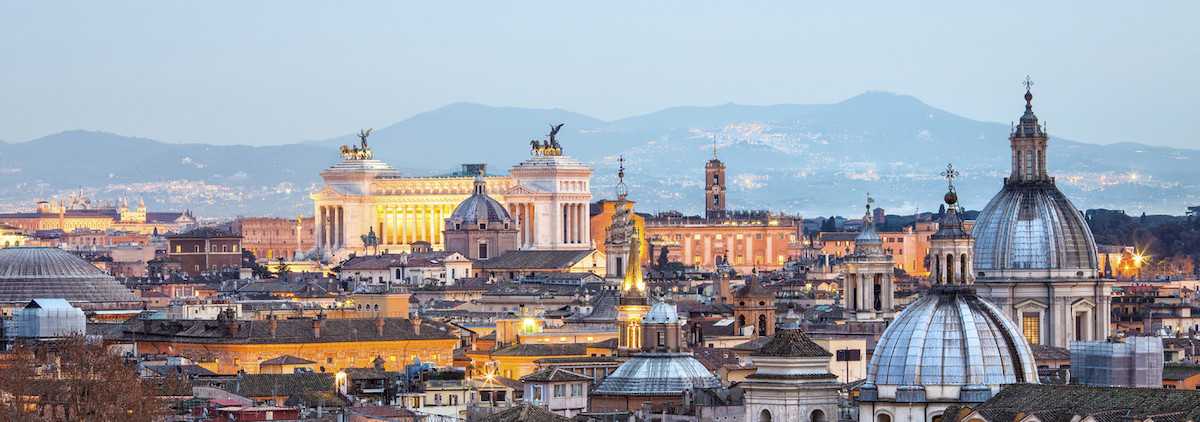Expat life in Rome: What expats really think
Thinking about starting a new chapter in Rome, but feeling overwhelmed? We’re here to help! Whether you’re curious about the everyday highs and lows of life in Rome or you’re eager to dive into the expat scene but don’t know where to start we’ve got your back! Read on to learn how to navigate the city like a local.
Advertisement
Brandon Le Clerk
What I really love about InterNations? Making new business contacts and friends in real life. This is a unique plattform.
Li Wang
At my first InterNations Rome Get-Together I met more expats then expected. InterNations made is so easy to settle in.
Why you'll love InterNations in Rome
and countless possibilities for fun and friendship!
Advertisement
Advertisement
Pros & Cons of Living in Rome: Insights from the Expat Insider Survey
Rome, the Eternal City, attracts expatriates from around the globe with its rich history, art, and culture. But it comes with its own set of challenges and benefits for those looking to call it home. Drawing from the Expat Insider 2024 survey comparing 53 global cities based on data from over 12,000 expats. Here’s a rundown of the pros and cons of expat life in Rome.
Pros:
Ease of settling in: Adjusting to life here is not too difficult, as 59% of expats say they feel at home in Rome (vs. 58% globally). Additionally, 55% of expats have a strong personal support network, suggesting a welcoming environment for newcomers.
Amazing food & culture: Not surprisingly, Rome ranks 11th for Culinary Variety & Dining Options. If you want to slow down and savor Italian food, this is the place to be. And 75% of expats are happy with the culture and nightlife (vs. 66% globally).
Personal finance: Rome ranks 18th for Cost of Living out of 53 global cities, with 47% of expats expressing satisfaction in this area (vs. 40% globally).


Cons:
Poorly rated by expats: Rome ranks 44th out of 53 global cities. Complex bureaucracy, unsatisfactory healthcare, and limited career opportunities place Rome near the bottom of the Expat Insider ranking.
Career woes: Career prospects are particularly bleak, with Rome ranking 52nd in this subcategory. A significant portion of expats (53%) are unhappy with the local job market (vs. just 31% globally).
Daily challenges: There are many challenging aspects when it comes to admin topics, including getting a visa (40% unhappy vs. 26% globally), opening a local bank account (43% unhappy vs. 24% globally), and dealing with bureaucracy (84% unhappy vs. 42% globally).
Quality of life hurdles: Issues with public transportation and infrastructure significantly impact quality of life. Also the city ranks just 41st for Health & Wellbeing.
Language barrier: Not many Italians speak English fluently, so many tasks will be hard to navigate unless your Italian is good enough. In fact, 75% of expats agree that it’s difficult to live here without speaking Italian (vs. 33% globally).
Advertisement
Join our exciting events in Rome
Ready to create a network of lifelong friends in Rome? Socialize, mingle, and meet people from different countries and cultures at InterNations Events. Our hosts are ready to welcome you and introduce you to the community. Keep an eye out for our Newcomers’ Events — a great way to begin your Rome adventure.




Advertisement
Advertisement
Frequently asked questions about expat life in Rome
Relocating to Rome can be both exciting and challenging. Whether you’re already planning your move or just considering it, you probably have a lot of questions.
To help you prepare, we’ve put together this comprehensive Q&A with everything expats need to know, making your transition to the Eternal City as smooth as possible.
First up, visas and residency permits. As an EU citizen, if you’re staying longer than three months, you must register with the local municipality (“commune”). But you don’t need a visa or residence permit.
If you’re a non-EU citizen and want to stay for longer than three months, you need to get a visa to enter and a residency permit (permesso di soggiorno) within eight days of arrival. For the latest requirements for foreigners coming to Italy based on your nationality, check the website of the Italian government.
Then there’s finances. If you have a job lined up already, then you don’t have to worry. But without a job waiting, try to have a rough idea how long you can manage in terms of your finances.
And finally, the language. If you don’t already speak Italian, then consider brushing up on your skills. Outside touristy areas, it will be difficult to get by with just English.
Although moving to Rome is not a walk in the park, prepping in advance can make a difference. For more in-depth info about visas and moving logistics, check out our detailed guide.
Rome stands out not just for its history but for its manageable living costs, especially compared to Milan, Paris, or Amsterdam.
For a comfortable life in Rome, a monthly income of around 2,500 EUR is ideal. In terms of rent, expect to pay about 1,100 EUR for a studio apartment in a central neighborhood.
Budget around 250 EUR for groceries. Dining out, say twice a week, might cost you around 120 EUR.
Public transportation is also affordable. A 1.50 EUR ticket lasts 75 minutes. Monthly and annual passes are available for 35 EUR and 250 EUR, respectively. Taxis start at 4 EUR, with a 1.30 EUR rate per km.
Overall, your lifestyle choices in Rome significantly impact your expenses. With smart budgeting, living in Rome can be financially viable.
With a big international community, Rome blends ancient charm with an expat-friendly vibe. But a heads-up — while in Rome, don’t expect English to be commonly spoken. Only about 35% of Italians speak English, so brushing up on your Italian will make your experience better.
Feeling social? Explore InterNations! It’s your go-to for connecting with fellow expats, making friends, and finding your people in Rome.
Rome’s diverse neighborhoods have their unique charms. Whether you’re looking for bustling city life, a serene family-friendly area, or something in between, Rome has something for you.
Monti: Close to iconic landmarks like the Colosseum, it’s perfect for those who enjoy local shops, small restaurants, and being in the center of everything. The proximity to Termini station is a plus for commuters.
Centro Storico: The heart of Rome and its most prestigious area, Centro Storico is surrounded by historical sites. It’s the most expensive neighborhood but offers easy access to public transportation. Be prepared for a lot of tourists and potentially challenging parking if you own a car.
Aventino: Ideal for families, Aventino is peaceful, close to the city’s ancient sites, and home to international schools and foreign offices. It’s a quiet area with few tourists, offering a peaceful living environment with historical sites like Circus Maximus nearby.
Trastevere: Known for its safety, exclusivity, and abundance of dining and shopping options. Parking can be difficult if your residence lacks private parking, making it better suited for those relying on public transportation.
Monteverde: A family-friendly neighborhood known for its green spaces, particularly Villa Pamphili park. It’s affordable and offers spacious living areas. Public transportation is readily available, connecting residents to central Rome.
Flaminio and Parioli: Upscale residential areas. Flaminio mixes modern and historical elements and has excellent public transportation to the city center. Parioli features wide streets, greenery, and luxurious homes, offering a quiet lifestyle.
San Giovanni: Despite being on the pricier side, its central location makes it attractive for expats who want to be close to the action and English-speaking locals.
Testaccio: This area is well-connected by public transport and you’ll find both traditional and modern restaurants.
Italy’s public healthcare system, Sistema Sanitario Nazionale (SSN) offers universal coverage. SSN is for citizens and legal residents, and covers everything from check-ups to surgeries without reaching deep into your pockets.
Italy’s public system is tax-funded, with contributions directly from your paycheck if you’re employed. Most folks stick with public healthcare. But since there can be long waiting times, or if you have chronic health issues or require specialized care, consider getting private health insurance.
In the private insurance scene, you’ll find two main types: corporate, which sometimes even covers your family and also additional services not included under the SSN, such as vision and dental insurance. There’s also non-corporate, where profit or non-profit organizations offer additional coverage options.
You can also go for global insurance: especially for globetrotters and expats who might move and travel to different countries, consider an international health insurance plan.
When in Rome, learn as the Romans do! It’s all about finding the right fit for your family.
Public schools welcome kids for free until their 16th birthday. After that, expect a tax contribution. Public education is a cost-effective option for expats planning a long stay.
For those seeking a touch of home or a global curriculum, Rome’s international schools are top tier. Fancy the British national curriculum? Try St. George’s School and New School. Looking for the American route? Check out the American Overseas School of Rome or Marymount International. And for the globally minded, Rome International School and Ambrit are great International Baccalaureate (IB) options.
Private institutions offer small class sizes and great facilities, but brace your wallet, these perks come with a price tag.
Navigating Rome’s bustling streets and ancient alleys might seem daunting at first. But whether you prefer the bus, metro, train, or tram, getting around is affordable and mostly user-friendly. Check out apps like URBI and MYCICERO to help you navigate.
Here’s how you can master the art of moving like a local in Italy’s storied capital:
The metro: There are three lines to choose from. They might not cover the whole city, but they’re perfect for hitting up all the major sights. The metro runs from 5:30 AM to 11:30 PM on weekdays and Sundays (stretching till 1:30 AM on Fridays and Saturdays).
The bus system: With over 350 lines, Rome’s buses are a puzzle worth solving. They’re your best bet for reaching places the metro misses, though they’re known for being less reliable. Keep an eye out for the Urban (U) lines for city outings, Night (N) buses for after-hours, Express (X) buses for longer trips, and Exact (E) buses for punctual transport needs.
The tram: Fancy a cleaner ride? Trams are spotless compared to buses, although they don’t venture into the city center. They run from dawn till midnight and are a scenic way to get around the city’s edges.
Urban railway: The railway fills in the gaps left by the metro and operates under the same ticket system. These trains run from 5:30 AM to 10:30 PM, connecting distant locations across Rome.
Taxis: Taxis are everywhere, but take care — while quick, they’re not the cheapest or most reliable. Drivers are known for taking the scenic route (and the scenic price!), so it’s wise to keep your wits about you.
When it comes to the nitty-gritty like house hunting, setting up your internet, or navigating the realms of local bureaucracy, not knowing Italian will be inconvenient.
To make day-to-day life more manageable, learning some Italian is a must. Even a handful of phrases can open doors, spark friendships, and help orient you in a foreign city. While you can survive using translation apps and gestures, a richer experience awaits those who embrace Italian.


InterNations is your key to discovering a thriving expat community right in the heart of Rome!
Through different events, become part of a fun social scene and meet people from around the world. Whether you’re looking to network, enjoy some cultural outings, or just have some fun, these gatherings are the place to be.
InterNations also offers a wide selection of groups catering to diverse interests — from networking to culture and entertainment, and even niche circles like women-only groups or volunteering and charity. Whatever your passion, there’s a group waiting for you.
So, if you’re eager to weave yourself into the fabric of Rome and meet some kindred spirits along the way, InterNations will make a big difference. Get ready to explore Rome with new friends by your side!
Rome is generally safe, of course, use your judgement and exercise caution. Always be aware of your surroundings, especially in crowded or less reputable areas. Stay alert and when in doubt, stick to the well-trodden paths.
While violent crime is rare in Rome, petty crimes like pickpocketing and scams are more common, especially in tourist-heavy areas. There are a couple of petty crime spots to be aware of, for example Esquilino. Located next to the bustling Termini train station, this area’s streets are marred by theft and scams. The area around Termini, particularly behind the station, is notorious for pickpockets, so beware of your surroundings and secure your belongings.
There’s also Corviale, once known for its massive, 1-km residential building in the 1970s, it now struggles with squatting, petty theft, and drug-related issues. It’s far from the city center so it’s not on the usual expat radar, making it easy to avoid.
Post offices in Rome are your go-to for more than just stamps. Registering as a new resident? Need a passport or your tax ID (codice fiscale)? The post office handles it all. But patience is a virtue here. Crowded spaces, long waits, and the occasional grumpy staff member are part of the package. And yes, the rules change more often than the seasons.
Another thing to know is “riposo”, the sacred quiet time from 2 to 4 pm in the afternoon. It’s the city’s pause button. Shops close, streets quiet down, it’s your chance to recharge.
Advertisement
Our Global Partners
Pursue your hobbies with amazing new friends
From arts and culture to business networking, our diverse groups offer something for everyone. Whether you’re looking to dive back into your hobbies or explore new interests, you’re guaranteed to find your perfect match.
Popular groups include the Rome Gateway of Culture Group, the** Rome Wine Tasting Group**, and the Rome Welcome Group, to name just a few. So do more of what you love in this historic city — and enjoy shared experiences with new friends!
Advertisement
Advertisement
Other Communities in Italy
Like-Minded Expatriates in Rome
Italy Guide Topics
Advertisement










